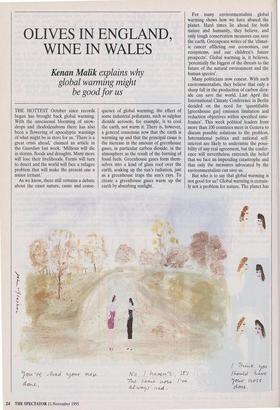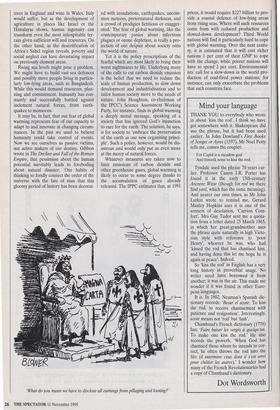OLIVES IN ENGLAND, WINE IN WALES
Kenan Malik explains why
global warming might be good for us
THE HOTTEST October since records began has brought back global warming. With the unseasonal blooming of snow- drops and rhododendrons there has also been a flowering of apocalyptic warnings of what might be in store for us. 'There is a great crisis ahead,' claimed an article in the Guardian last week. 'Millions will die in storms, floods and droughts. Many more will lose their livelihoods. Farms will turn to desert and the world will face a refugee problem that will make the present one a minor irritant.'
As we know, there still remains a debate about the exact nature, cause and conse- quence of global warming; the effect of some industrial pollutants, such as sulphur dioxide aerosols, for example, is to cool the earth, not warm it. There is, however, a general consensus now that the earth is warming up and that the principal cause is the increase in the amount of greenhouse gases, in particular carbon dioxide, in the atmosphere as the result of the burning of fossil fuels. Greenhouse gases form them- selves into a kind of glass roof over the earth, soaking up the sun's radiation, just as a greenhouse traps the sun's rays. To create a greenhouse gases warm up the earth by absorbing sunlight. For many environmentalists global warming shows how we have abused the planet. Hard times lie ahead for both nature and humanity, they believe, and only tough conservation measures can save the earth. Greenpeace writes of the 'climat- ic cancer afflicting our economies, our ecosystems, and our children's future prospects'. Global warming is, it believes, `potentially the biggest of the threats to the future of the natural environment and the human species'. Many politicians now concur. With such environmentalists, they believe that only a sharp fall in the production of carbon diox- ide can save the world. Last April the International Climate Conference in Berlin decided on the need for 'quantifiable [greenhouse gas] emission limitation and reduction objectives within specified time- frames'. This week political leaders from more than 100 countries meet in Geneva to discuss possible solutions to the problem. International politics and national self- interest are likely to undermine the possi- bility of any real agreement, but the confer- ence will nevertheless entrench the belief that we face an impending catastrophe and that only the measures advocated by the environmentalists can save us.
But who is to say that global warming is not good for us? Global warming is certain- ly not a problem for nature. The planet has no preferred state, no ideal climate or temperature. Nor, for that matter is there an ideal or normal carbon dioxide level. The concept of ecological balance is a romantic Green myth. Nature is in a con- stant state of flux and the earth's history is characterised by continual change.
The dinosaurs lived in a world that was 10 to 20 degrees warmer than today, a world in which carbon dioxide levels were between five and 10 times higher. Around 8,000 years ago, the earth abruptly cooled by four degrees before rapidly warming again 200 years later. More recently still, in the warm period between the 12th and the 14th centuries, temperatures were on aver- age one degree higher than today, while in the 'little Ice Age' that followed they fell significantly lower. In raising global tem- perature, therefore, humanity is not doing anything to nature that nature has not already done to itself, and often much more drastically than we could conceive.
Nor is there any evidence that a warmer climate in itself is harmful to humanity. Human beings have endured major climat- ic changes throughout their history without major problems. In fact, human culture began to develop some 30,000 years ago during the last major Ice Age. The end of that Ice Age, 10,000 years ago, marked the beginnings of agriculture. In more recent times, the transformation of the life of Europe during the Renaissance and the Enlightenment occurred during the little Ice Age. This is not to claim that climatic changes cause human progress, but simply that such changes need not be a barrier to social advance, so long as we approach them with the right attitude. Global warming would certainly create problems for humanity, but it may also provide opportunities. The weather would worsen in certain areas, but it would Improve in others. Of course, there would be winners and losers: Northern Europe, for one, would gain. We might have olive trees in England and wine in Wales. Italy would suffer, but as the development of agriculture in places like Israel or the Himalayas shows, human ingenuity can transform even the most inhospitable ter- rain given sufficient will and resources. On the other hand, as the desertification of Africa's Sahel region reveals, poverty and social neglect can have devastating impact on previously clement areas.
Rising sea levels might pose a problem. We might have to build vast sea defences and possibly move people living in particu- larly low-lying areas, such as Bangladesh. While this would demand resources, plan- ning and commitment, humanity has con- stantly and successfully battled against inclement natural forces, from earth- quakes to monsoons.
It may be, in fact, that our fear of global warming represents fear of our capacity to adapt to and innovate in changing circum- stances. In the past we used to believe humanity could take control of events. Now we see ourselves as passive victims, not active makers of our destiny. Gibbon wrote in The Decline and Fall of the Roman Empire, that pessimism about the human potential inevitably leads to foreboding about natural disaster: 'Our habits of thinking so fondly connect the order of the universe with the fate of man that this gloomy period of history has been decorat- ed with inundations, earthquakes, uncom- mon meteors, preternatural darkness, and a crowd of prodigies fictitious or exagger- ated.' The fear of global warming, like the contemporary panics about infectious plagues or ozone depletion, is really a pro- jection of our despair about society onto the world of nature.
Yet it is the policy prescriptions of the fearful which are most likely to bring their worst nightmares to life. Underlying many of the calls to cut carbon dioxide emission is the belief that we need to reduce the scale of human production, to slow down development and industrialisation and to tailor human society more to the needs of nature. John Houghton, co-chairman of the IPCC's Science Assessment Working Party, for instance, finds in global warming a deeply moral message, speaking of a society that has ignored God's injunction to care for the earth. The solution, he says, is for society to 'embrace the preservation of the earth as our new organising princi- ple'. Such a policy, however, would be dis- astrous and would only put us even more at the mercy of natural forces.
Whatever measures are taken now to limit emissions of carbon dioxide and other greenhouse gases, global warming is likely to occur to some degree thanks to the accumulation of gases already released. The IPPC estimates that, at 1991 `What do you mean we have to disclose all earnings from pillaging and looting?'
prices, it would require $227 billion to pro- vide a coastal defence of low-lying areas from rising seas. Where will such resources come from with reduced production and slowed-down development? Third World nations will find it particularly hard to cope with global warming. Over the next centu- ry, it is estimated that it will cost richer nations 1 per cent of their GNP to cope with the change, while poorer nations will have to spend 2 per cent. Environmental- ists' call for a slow-down in the world pro- duction of coal-fired power stations, for instance, can only exacerbate the problems that such countries face.




















































































 Previous page
Previous page